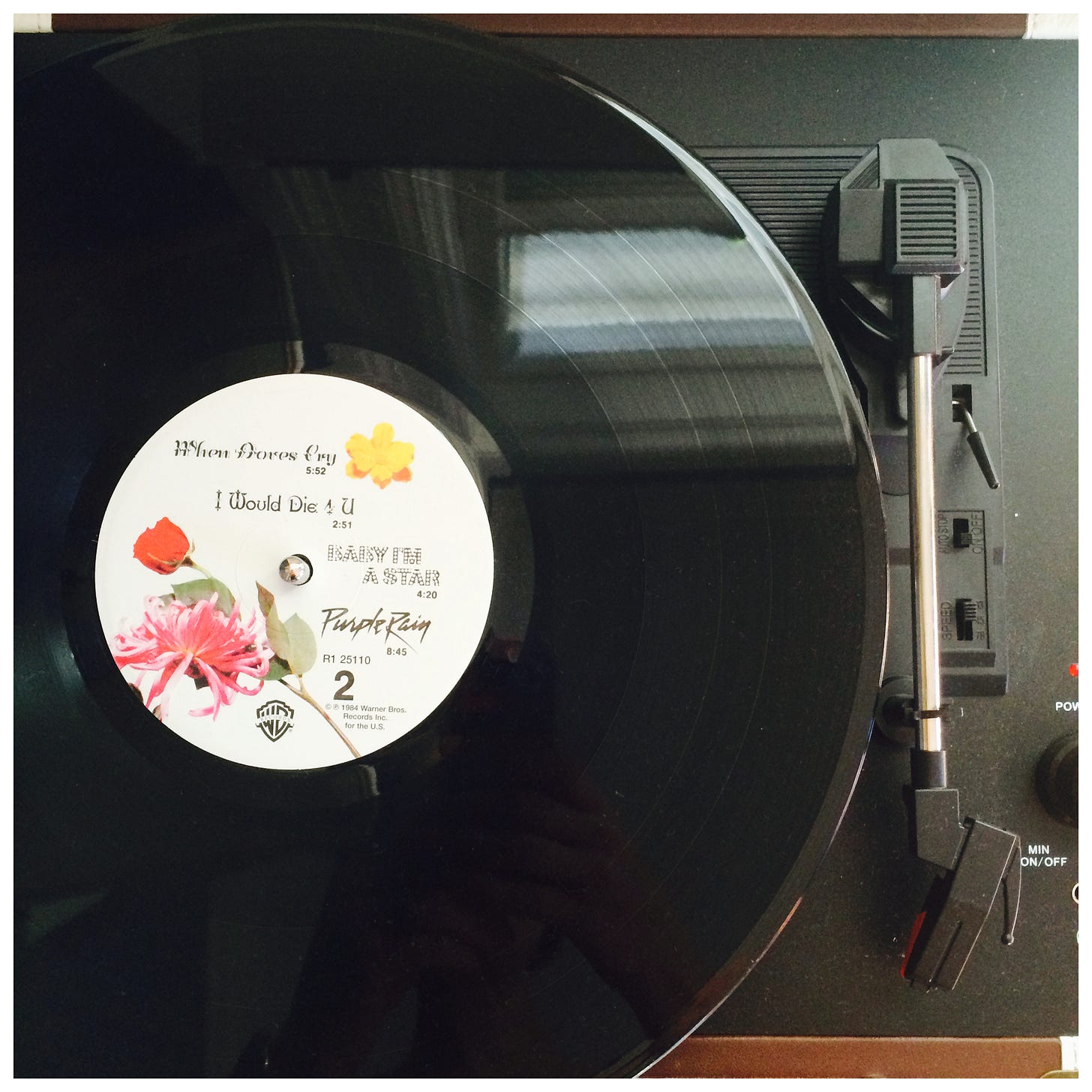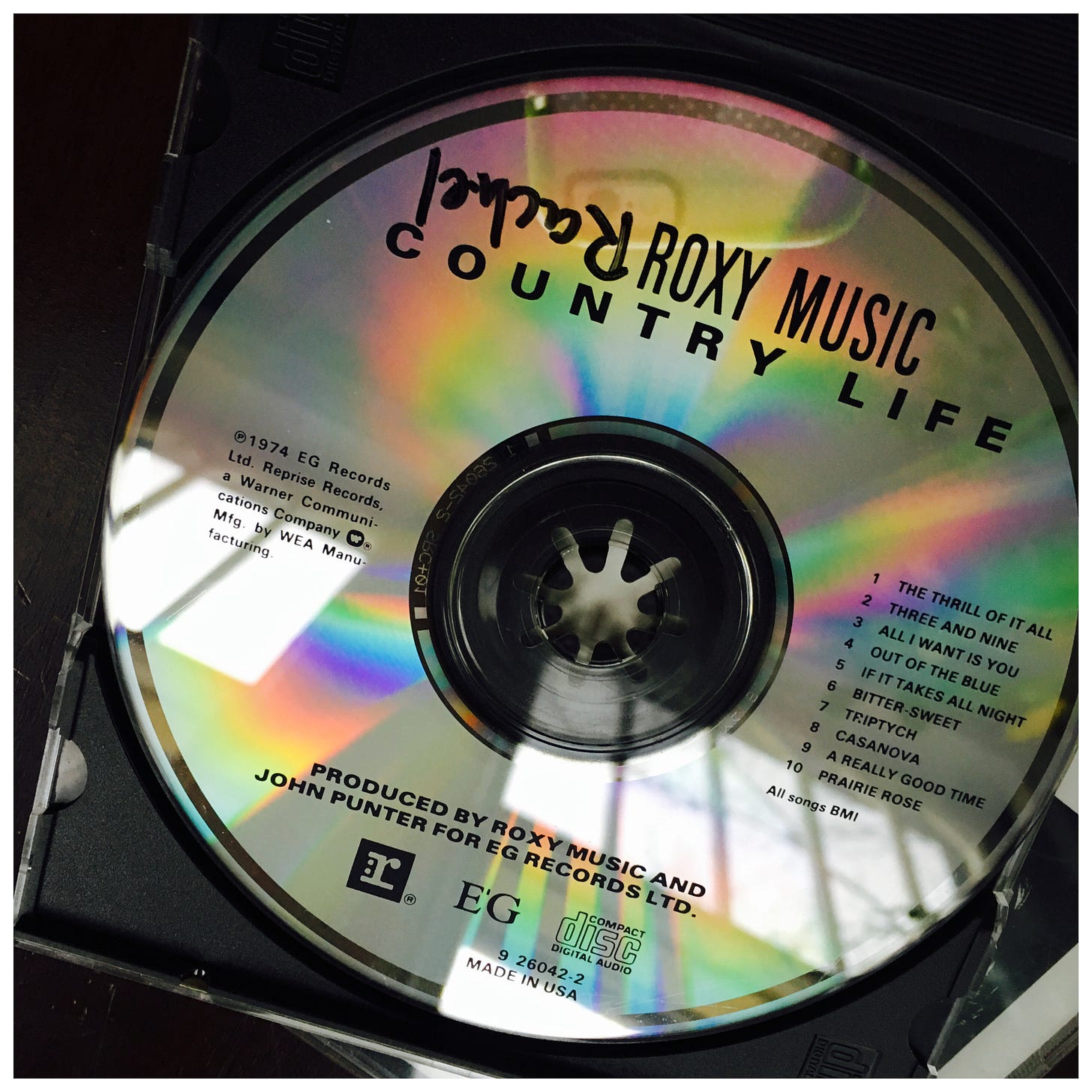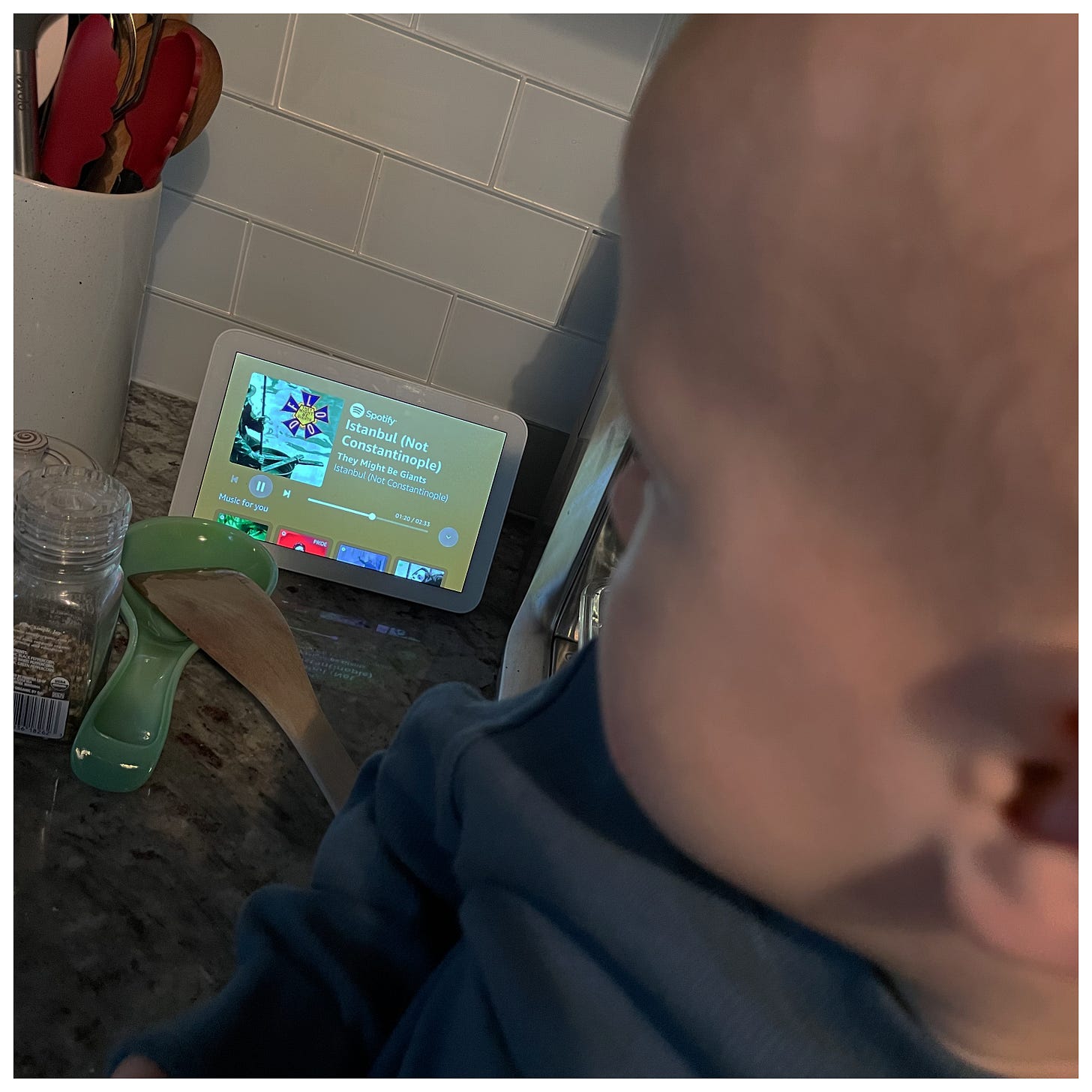Last night at the pub I got into an animated conversation with a friend about what it means to be a hard-core music fan. In my experience, this is a topic that can quite quickly become heated, as strong opinions about music genre and era quickly come to the fore—even among friends. I enjoy these conversations. Partly because I think of myself as a person who is crazy about music and partly because I like spirited debate and am blessed with lots of opinions.
At the same time, I don’t love these conversations. They can feel like a contest and I’m not sure how to win. Also, as an aside, if you’re a girl, you’ve maybe gotten used to hearing your preferred music isn’t any good (too derivative, too over-produced, too mainstream, too something). Sometimes it can feel like only men get to be true music fans.
Anyway, clearly my hackles were raised, because here I am, sitting in my bed on a Saturday morning, writing about music.1
The Rock & Roll T-Shirt That Proves You Were There, That You Heard of Them First
So I woke up thinking about music metrics: how would we assess how “crazy about music” a person is? Is it about live music? Number of concerts attended? Is it about the scale of those concerts? For example, I’ve definitely been party to discussions about the relative value of club versus stadium gigs. Usually the club wins.
Is it about number of minutes per day spent listening to music? I admit that I love to see my “Spotify wrapped” each year, where I find out how much time I listened to music (for me, strongly correlated with how much time I spent travelling) and which songs and bands I dedicated the most time to.
Is it about diversity or range of music preferences? Here, too, Spotify steps in every year to inform us how many genres we’ve listened to, although their idea of a “genre” is much more arcane than mine.
Or is it about number of albums owned? Like, is a real music fan a person with shelves lined with CDs or vinyl records? For many, this is probably the traditional metric for A Real Music Fan.
If it’s the latter, though, this is going to be almost wholly determined by age. It would be unusual for anyone under 50 to possess an extensive record collection and yet I am sure there are plenty of young folks out there who adore music.
This got me thinking about generations (which we’re not supposed to believe in, by the way)—not generations and music preference, but generations and material musical culture. Every age has its musical material culture—45s, records, cassettes, CDs, iPods, even Spotify. Not just what we listen to, but how.
At this point the demographer in me was well and truly awake and asked for her morning coffee and her laptop.
Talking About My Generation
Here’s an assertion I bet you’ve never heard before: my own generation is pretty unique.
(For one thing, I’m old enough to make clever allusions to The Who, without having, you know, actually ever listened to them.)
By generation, I mean my musical generation, which I will narrowly define as those born into the age of the vinyl record, weaned on the cassette tape2, and matured under the brief reign of the CD, or compact disc. Generation Tape Cassette, if you will.
The materiality of the medium matters. Records were relatively accessible, but not free. You had to choose which music to invest in and those choices, I think, were often taken as a strong signal of identity. I say, “I think”, because this is not my generation. To me, records were my parents’ thing: my mom’s There Goes Rhymin’ Simon record, which I loved to look at the cover of, or the Beatles’ White album, which was far less interesting to look at.
My musical medium was the cassette. Small, portable, and incredibly delicate. You could take your music anywhere, but you also had to be prepared to very carefully spool the tape back into its housing, often with the eraser-end of a yellow Number 2 pencil. Like Proust’s madeleine, the thought of a cassette tape transports me back in time: third grade in rural southern Indiana, in fact, and the girl who brought her portable cassette player and the Go-Gos’ Beauty and the Beat onto the playground at morning recess. How we all crowded around to listen. Learning the symbols on the machine for fast forward and rewind. Unfolding the cassette cover, much like a record insert, to see if there were song lyrics included.
Here’s the thing. Cassettes, like records, were not cheap, so the association between music and identity remained tight.3 You also listened to cassettes in the same way you’d listen to a record—in track order and from one side to another. This made us more like the musical generations that preceded us. Apart from that, however, cassettes were a game changer. For one thing, there was the portable cassette player (and later the Sony Walkman), which meant you could take your music with you everywhere, including the playground and the school bus.
For another, you could buy blank cassette tapes and record songs from the radio at will, which meant you were no longer hostage to buying the entire album for just one song. Many is the hour my sister and friends and I spent lying on the floor in front of the radio speaker, poised to hit “record” the moment our favourite songs came on.
And then in high school we had the mixed tape. My heart goes out to all who came before Generation Tape Casette and all who succeeded us, that you didn’t experience the magic of teenage romance and the mixed tape. Those were the days.
Unfortunately, cassette tapes were not durable. The more you played them the shorter their lifespan. RIP, mixed tapes of my youth.
Tell Me More, Tell Me More
I was about to write that, of course, most of my adulthood has been about the CD.
But that’s not true.
My formative years—university and young adulthood—were dominated by the compact disc, but the era of CD dominance was vanishingly short (roughly 1990–2000 for me) and the material evidence I can draw on to demonstrate my madness for music now sits in boxes gathering dust in an attic somewhere.
What this means is that Generation Tape Cassette has the attachment to music of an older generation, but our material music culture is closer to that of today’s youth. After all, long before Spotify was criticised for shifting music consumption, we had Napster and iTunes, all facilitating our consumption of music but rupturing the connection to the material aspect of it—the part where music was a concrete thing.
Can’t Get There from Here
So where does this get us with a metric for “mad about music”? I propose it’s generationist to base it on how much physical music one owns, since that basically means it's those born before 1970 who will qualify.4
Minutes of music per day might work, although there are those who happily have ambient music playing all the time, and maybe those are precisely the people who don’t really care about music. (My hot take.)
Concert attendance could also work, although Pandemic Times render this a problematic statistic.
I think my pub friend might suggest that Music Madness is about an inquisitiveness towards the new and unknown. The desire to go see new bands and to be excited by discovery. This could work. I do not perform well on this metric, but it’s a good one.
What a Drag It Is Getting Old
How about some qualitative measures to establish my music credibility? For example, I pride myself on raising my kids to know not only my music, but also the music of my parents. To that end, I maintain a Spotify playlist I call “Canon”—the music I like to think my kids should be familiar with by the time they head out into the world (currently 34 hours and 41 minutes).
My kids can identify a Smiths song in seconds. They have opinions about the Beatles versus the Rolling Stones. One of them currently raves about Billy Joel’s songwriting abilities. This all makes me proud.
Or how about this for a metric of something: we own the Best of 50 Cent on vinyl.
On the other hand, when I recently commended myself on my eclectic musical tastes, my daughter said yes, that my music tastes are varied, like a traffic roundabout with many exits…however, the roundabout itself is located out in the middle of the countryside. Ouch. One of the other kids maintains a list of his least favourite bands, which are all my music, and currently include the Decemberists, Stars, and, I am willing to bet, Tegan and Sara.
To a young person maybe no one older than them can possibly be a hardcore music fan. I’m going to go think on it while I work on a Kid Canon for my grandkid.
Leonard Cohen is playing, who I hope we will all agree is real music.
Interestingly, I grew up calling it a tape cassette, but the internet is insisting that it’s the other way around: cassette tape.
I spent my heard-earned money on They Might Be Giants and REM, but not Guns N’ Roses, for example
Although I remember my first iPod, which also very much felt like a music thing, albeit as ephemeral as the cassette tape was, in the end.






